Airbnb hosts lose 5-15% of their revenue to platform fees with every booking. There’s a pretty straightforward fix, but a lot of property owners just don’t see it.
Creating a direct booking website lets hosts dodge those hefty commissions. You get to call the shots with your guest relationships and pricing strategies.
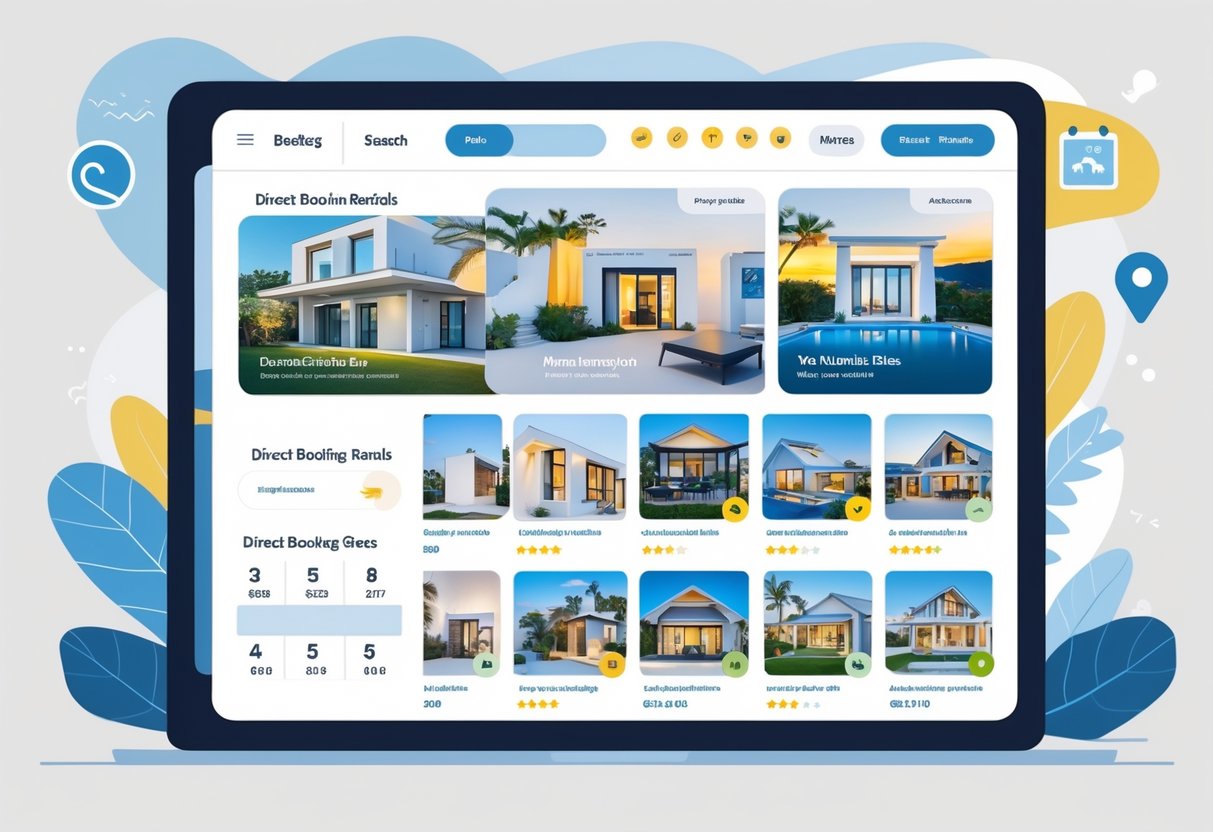
Building an Airbnb direct booking website can save hosts thousands every year. It puts you in control and frees you from platform restrictions and random algorithm tweaks.
Direct booking websites cut out the middleman. Hosts can keep more profit and offer guests a more personalized experience—something you just can’t do on third-party platforms.
Setting up a direct booking site? It’s honestly way easier now than it used to be. Modern vacation rental software and website builders let you launch a slick site in just a few hours.
You can get payment processing, calendar management, and automated guest communications—all the bells and whistles the big platforms have.
Key Takeaways
- Direct booking websites chop out 5-15% platform fees and hand hosts full control over pricing and guest relationships.
- Modern vacation rental website builders make professional sites quick and affordable for anyone.
- You’ll need good marketing, great guest service, and solid booking management tools for direct booking success.
What Is an Airbnb Direct Booking Website?
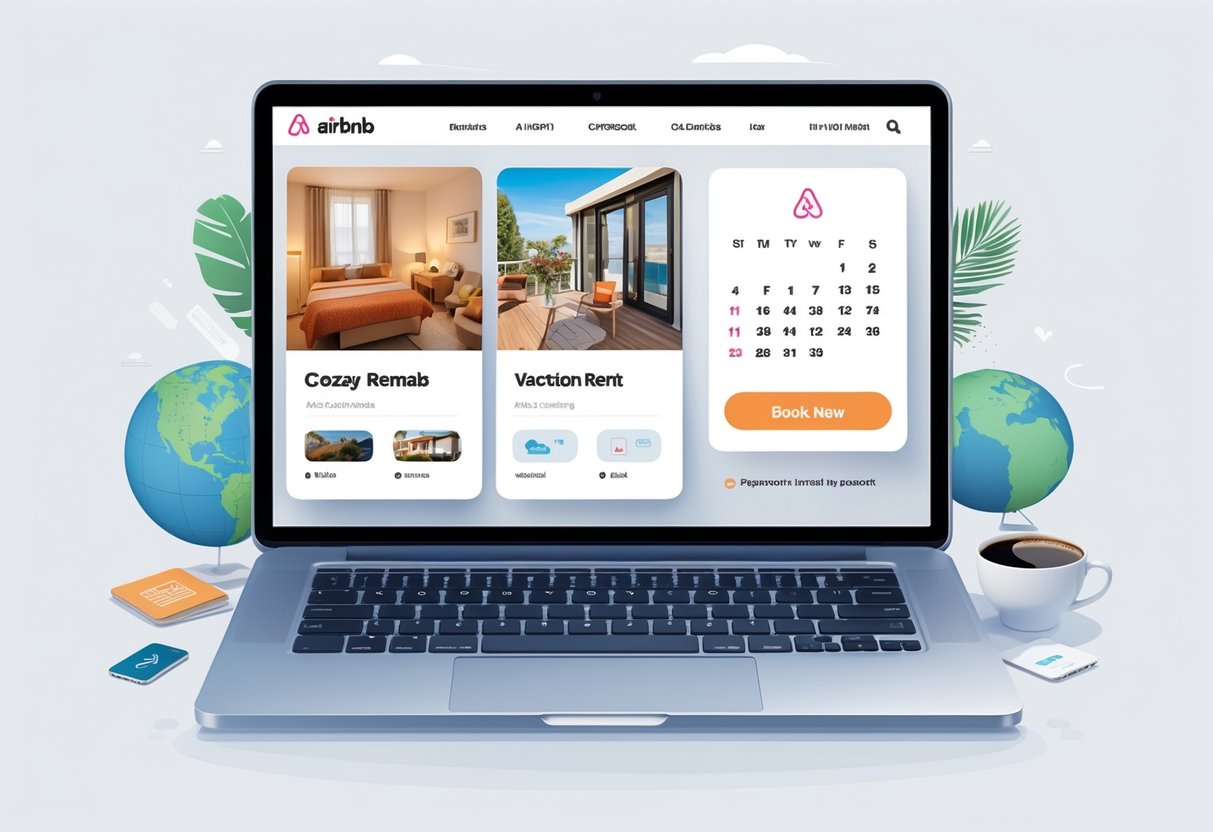
An Airbnb direct booking website lets property owners accept reservations directly from guests. No third-party platforms, no extra commission fees.
These sites eliminate commission fees and put you in the driver’s seat with pricing, policies, and guest relationships.
How Direct Booking Differs From Listing Platforms
Direct booking websites let you take reservations straight from guests, skipping the platforms entirely. You get your own branded website where guests check availability and book their stay.
The big difference? Control and communication. Platform listings follow strict rules set by Airbnb or Vrbo, but your direct booking site runs on your terms.
Key differences include:
- Fees: No platform commissions versus 3-15% platform fees
- Communication: Direct contact versus restricted messaging
- Branding: Custom website design versus template layouts
- Policies: Host-created rules versus platform requirements
Guests deal with you from the get-go. That means stronger relationships and more room to customize service.
You pick your payment processor—Stripe, PayPal, Square, whatever works for you. No forced platform payment systems.
Why Hosts Are Shifting to Direct Bookings
Platform fees take a real bite out of rental income. Airbnb usually charges hosts 3-5% per booking, and guests can get hit with up to 14% more in service fees.
If you’re earning $50,000 a year through Airbnb, you might be paying $2,500 to $7,500 in fees alone. Direct bookings wipe out those costs.
Financial benefits include:
- Higher profit margins per booking
- Ability to offer guests lower prices
- No surprise fee hikes from platforms
- Full control over your revenue
Direct bookings average $1,935 per reservation compared to $906 on Airbnb. Guests tend to stay longer too—about 5.9 nights versus 4.5 on platforms.
You also get access to valuable guest data that platforms usually keep to themselves. Email addresses, preferences, and booking history are all yours for future marketing.
Depending too much on platforms is risky. One algorithm change or new rule can tank your bookings overnight.
Direct Booking Versus Airbnb and Vrbo
Direct booking websites and platforms both have their place in a rental strategy. Most savvy hosts use both, and honestly, that’s probably the way to go.
Airbnb and Vrbo get you in front of tons of travelers. Their marketing reach and name recognition pull in first-time guests like nothing else.
Platform advantages:
- Built-in guest trust and security
- Huge marketing reach
- Established booking processes
- Customer service support
Direct booking shines when it comes to repeat business and bigger reservations. Guests who book direct often turn into regulars.
The average direct booking brings in more revenue because you’re not fighting for scraps in a crowded search result.
Platforms work well as lead generators. Attract guests through Airbnb, then wow them with your service and nudge them to book direct next time.
A lot of hosts keep their platform listings live while building up their direct booking game. It’s a smart way to diversify income and not put all your eggs in one basket.
Benefits of Building Your Own Booking Site
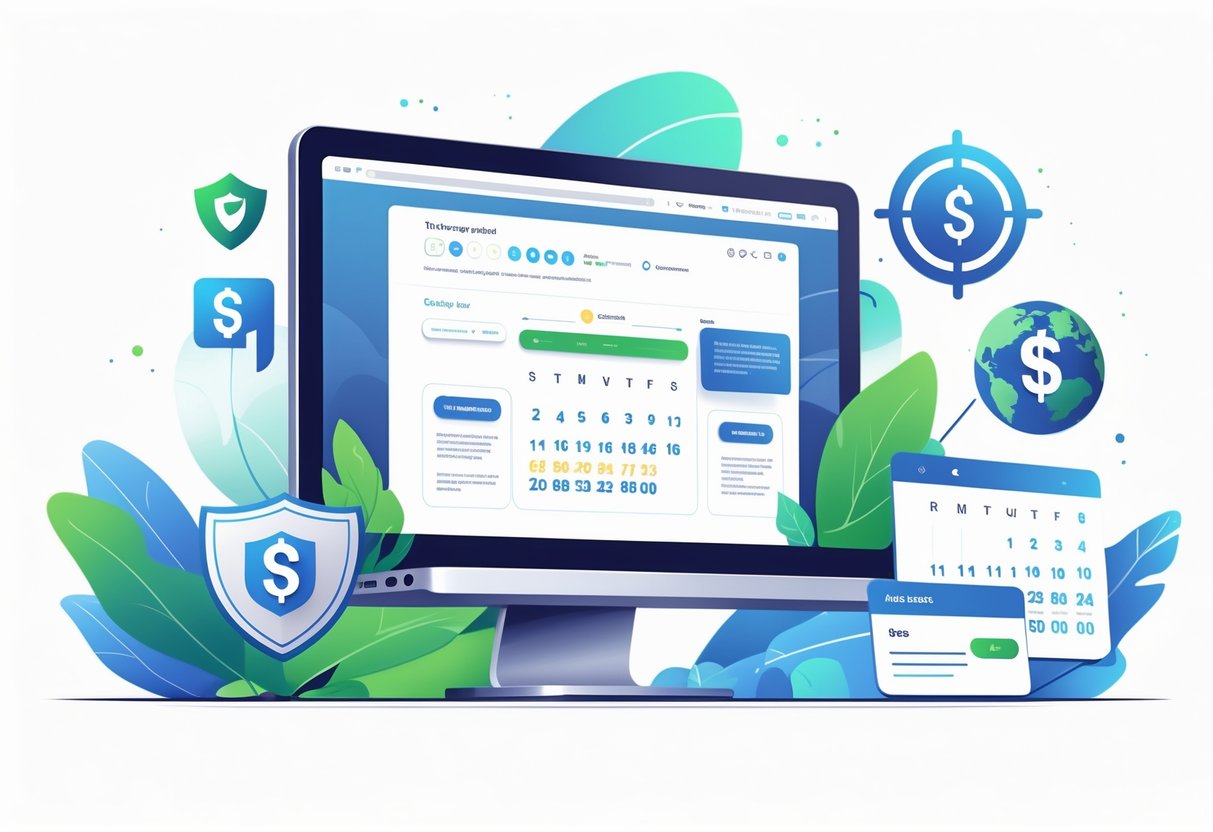
When you build your own booking site, you keep more cash from every reservation. You also control pricing and guest communication, which is a big deal.
Direct booking websites cut out platform commission fees and let you truly run your rental business.
Control Over Guest Relationships
Platforms limit how you talk to guests. Airbnb, for example, blocks contact info until after booking, which makes it tough to build real connections.
Direct booking sites break down those walls. You can share phone numbers, emails, and even social media right away.
Send detailed check-in instructions, local tips, or personalized welcome messages—all without platform interference.
Direct communication perks:
- Phone chats before booking
- Email marketing to past guests
- Custom welcome packages and local insights
- Quick replies to questions
- Personal follow-up after checkout
You get to collect valuable guest data through your own site. Stuff like email addresses, booking preferences, and stay history helps you market smarter.
The relationship feels more personal. Guests remember you, not just your listing.
Eliminating Platform Fees
Airbnb usually takes 3-15% in service fees from each booking. Guests sometimes pay another 14-16% on top, which adds up fast and eats into your profit.
Fee comparison:
| Booking Method | Host Fees | Guest Fees | Total Platform Cost |
|---|---|---|---|
| Platform booking | 3-15% | 14-16% | Up to 31% |
| Direct booking | 0% | 0% | Payment processing only (2.9%) |
Earning $50,000 a year on Airbnb? You’re losing $2,500 to $7,500 in fees. Direct bookings let you keep that money.
Payment processors like Stripe or PayPal only charge around 2.9% plus 30 cents per transaction. That’s a huge difference.
The financial upside just gets better over time. If you move even 30-40% of your bookings to direct channels, you’ll see a big bump in revenue without buying more properties.
Establishing Brand Identity
Platform listings all look kind of the same, no matter how unique your property is. You can’t really customize layouts, colors, or messaging.
Direct booking sites let you own your brand. Design a custom logo, pick your colors, and write descriptions that actually sound like you.
Show off your property with professional photos, without worrying about platform compression or weird restrictions.
Branding essentials:
- Custom domain names (like OceanViewRentals.com)
- Personalized logo and consistent colors
- Unique property stories and descriptions
- Social media links and custom email addresses
- Local expertise and recommendations
Building trust with branding is more than just a logo, but it matters. A consistent visual identity makes you look professional.
Guests start to recognize your brand, not just your platform listing. That kind of recognition leads to more repeat bookings and word-of-mouth referrals.
Long-Term Business Stability
Platforms can change the rules, algorithms, or fees whenever they want. If you’re dependent on them, that’s a risky place to be.
Building a more independent rental business helps you weather those changes.
Algorithm shifts can bury your listing overnight. New platform rules might force you to make expensive updates or even suspend your account.
Direct booking sites give you a safety net. You keep your guest database and booking history, no matter what happens on the platforms.
SEO optimization brings in organic traffic that you control.
Stability benefits:
- Protection from sudden platform changes
- Ownership of customer data and relationships
- Multiple revenue streams for less risk
- Long-term business value, even if you sell the property
- Freedom from ranking algorithms
Combining financial benefits with business security makes direct booking sites a must for serious hosts. You build equity in your own brand, not just someone else’s platform.
Essential Features of a Vacation Rental Website
A good vacation rental website needs certain features to make booking easy for guests and keep your business safe. Mobile design, booking systems, secure payments, and guest reviews are the foundation.
Mobile-Friendly and Responsive Design
Most travelers book rentals on their phones or tablets these days. Your vacation rental website design has to look and work great on any device.
A responsive design adjusts automatically. Text stays readable, buttons are easy to tap, and photos look sharp whether you’re on a phone or a laptop.
Google even ranks mobile-friendly sites higher. If your site doesn’t work on mobile, you’re losing bookings and search visibility.
Key mobile features:
- Fast loading times (under 3 seconds is the goal)
- Big, easy-to-tap buttons for booking
- Simple navigation menus for touch screens
- Readable text—no zooming needed
Always test your site on different devices. Most website builders have mobile previews to help you spot issues.
Custom Booking Forms and Widgets
A booking widget lets guests check dates and book directly on your site. It should be easy to find on every page.
Booking forms need date selection, guest count, and instant availability checks. Show your rates clearly and make sure the total cost is obvious (taxes, fees, the whole deal).
Booking Form Must-Haves:
| Feature | Purpose |
|---|---|
| Calendar picker | Shows available dates clearly |
| Guest counter | Handles capacity limits |
| Rate calculator | Displays accurate pricing |
| Property photos | Confirms booking details |
Keep the form short—ask for what you need (names, contact info, special requests) but don’t make it a chore.
The simpler the booking process, the better. Every extra step gives guests a chance to bail.
Integrated Payment Processing
You need secure payment processing to build trust and protect your business. Choose systems that handle credit cards, debit cards, and digital wallets.
Stripe, PayPal, and Square are the go-tos. They encrypt payment info and meet industry security standards.
Payment Security Features:
- SSL certificates for encrypted transactions
- PCI compliance for card data protection
- Fraud detection tools
- Backup payment options
Offer several payment types. Some guests like PayPal, others want to use Apple Pay or a credit card.
Set up automatic collection for deposits, final payments, and security deposits. It’ll save you hassle and keep your cash flow steady.
Guest Reviews and Social Proof
Guest reviews convince new visitors to book your property. Put testimonials front and center on your vacation rental website to boost credibility.
Ask past guests for reviews through follow-up emails after their stay. Make it easy—just send direct links and clear instructions.
Review Display Options:
-
Star ratings paired with written testimonials
-
Photo reviews that capture guest experiences
-
Video testimonials for extra impact
-
Recent review highlights on your homepage
Reviews from several platforms strengthen your reputation. Add testimonials from Airbnb, VRBO, and Google right alongside your direct booking reviews.
Always respond to reviews, whether they’re glowing or less than perfect. This shows potential guests you care and that you handle issues head-on.
Show your overall rating and total review count near your booking widget. Social proof like this often tips the scales for visitors deciding whether to book or bounce.
Choosing the Best Website Builder and Tools
The platform you choose really matters. Purpose-built vacation rental website builders offer specialized features, while general builders like WordPress and Squarespace give you more design freedom, though with a steeper learning curve.
Purpose-Built Vacation Rental Website Builders
Specialized vacation rental website builders come with booking tools built in. These platforms know what property owners actually need.
Lodgify packs in full property management features. You can handle bookings, payments, and guest chats from one dashboard. It even connects to major booking channels automatically.
Uplisting zeroes in on multi-channel management. It syncs calendars across platforms and blocks double bookings. The system updates rates and availability in real time.
Wix tops the list for vacation rentals with travel-ready templates. It has built-in booking systems and automated marketing tools. You can plug in dedicated builders like Lodgify for more advanced features.
Expect to pay $30-100 per month for these builders. That covers hosting, SSL, and payment processing. Most offer commission-free bookings—unlike Airbnb’s 3-14% fees.
The main downside? You get less design control. Templates can look a bit cookie-cutter if lots of hosts use the same platform.
Using WordPress, Squarespace, or Website Templates
General website builders give you more creative freedom but take more effort to set up. You get total control over your site’s look and vibe.
WordPress is as flexible as it gets. Install vacation rental plugins like WP Hotel Booking or Hotel Booking Pro for booking features. Be ready for some tech work or to bring in a developer.
Squarespace delivers gorgeous templates for unique branding. Every design stands out. It includes scheduling and booking tools via Acuity Scheduling integration.
Website templates from these builders usually need booking features added separately. That means you’ll likely need to integrate third-party booking engines or payment processors.
Basic plans run $15-40 per month. Add-ons and plugins bump up costs. Setup takes longer than with specialized builders, but you get more room to make your brand shine.
Integrating Channel Managers and Booking Engines
Channel managers keep your bookings in sync across platforms. They stop double bookings and update availability automatically.
Channel managers connect your direct booking site to Airbnb, VRBO, and Booking.com. OwnerRez, MyVR, and Hostfully are popular picks. They sync calendars, rates, and property info everywhere.
Booking engines handle reservations on your website. They manage calendars, take payments, and send confirmation emails. Many work hand-in-hand with channel managers.
Wix Hotels app includes channel management for over 150 booking channels. Usually, you won’t need extra tools.
Integration costs are all over the place. Some builders throw these features in for free. Standalone channel managers can run $20-100 a month, depending on how many properties you’ve got.
Choose tools that play nicely together. If your systems don’t mesh, you’ll just end up with more headaches.
Setting Up Payment Systems and Pricing Strategies
Payment processors and pricing tools are the backbone of any direct booking website. Hosts need reliable payment systems and smart pricing to compete and make the most of every booking.
Enabling Stripe, PayPal, and Square
Stripe is the go-to for vacation rental sites. It handles credit cards, debit cards, and digital wallets, charging about 2.9% plus 30 cents per transaction.
Most booking software integrates easily with Stripe. It supports international payments and works with over 135 currencies.
PayPal is familiar and trusted by many guests. It charges 2.9% plus a fixed fee for domestic transactions.
PayPal is handy for repeat guests who don’t want to re-enter card details. It also offers buyer protection, which can boost guest confidence.
Square charges similar rates—2.9% plus 30 cents per transaction. It’s a good fit for hosts who also take in-person payments or run other business activities.
Most hosts offer at least two payment options. This gives guests flexibility and helps reduce abandoned bookings if one processor has issues.
Dynamic Pricing and Rate Management
Dynamic pricing changes your rates based on demand, season, and local events. Airbnb hosts can tweak availability and offer discounts to stay competitive.
Smart pricing tools scan competitor rates in real time. They bump up your prices during high-demand times like holidays or festivals.
Base rate setting takes a little research. Check rates for similar listings within a couple of miles.
Seasonal adjustments matter too. Beach rentals go up in summer, ski cabins in winter—you get the idea.
Minimum stay requirements help you make the most during busy periods. Many hosts set 3-night minimums on weekends and 7-night minimums during peak season.
The best hosts tweak their pricing every week. Strategic pricing can really boost bookings and revenue if you do it right.
Handling Discounts and Promotions
Early bird discounts encourage advance bookings and help your cash flow. Offer 10-15% off for guests who book 60 days out.
Last-minute deals fill those pesky gaps in your calendar. Hosts often give 20-25% off for bookings within a week of check-in.
Weekly and monthly rates attract longer stays that save you turnover costs. Standard discounts? Usually 15% for weekly and 25% for monthly bookings.
Repeat guest incentives keep people coming back and cut your marketing spend. Direct booking sites can spot return visitors and auto-apply 5-10% discounts.
Promotional codes work for social media campaigns and partnerships. Make custom codes for social media or local deals.
Set rules for discounts so you don’t overbook during peak times. Most booking systems let you turn off promos automatically for high-demand dates.
Launching and Promoting Your Direct Booking Website
Once your website goes live, you’ve got to get it in front of guests and make it look trustworthy. It’s all about blending smart SEO, strong branding, and smart promotion across different channels.
Optimizing Vacation Rental SEO
Search engine optimization helps travelers find your property when they’re searching for places to stay nearby. Start with keywords that real guests actually use.
Target phrases like “vacation rental in [city name]” or “furnished apartment [neighborhood]” in your page titles and descriptions. Work these terms into your property descriptions naturally—no keyword stuffing.
Essential SEO Elements:
-
Page titles under 60 characters with your location
-
Meta descriptions that mention amenities and location
-
Image alt text for each room or feature
-
Local business schema markup for search engines
Make location pages for nearby attractions, restaurants, and activities. This not only helps with vacation rental SEO but also adds value for your guests.
Update your Google Business Profile with your rental info. Add photos, reply to reviews, and keep your contact details fresh.
Links help too. Partner with local businesses, tourism boards, and travel bloggers to earn quality backlinks.
Branding and Logo Integration
Solid branding makes your place look trustworthy and memorable. Guests are way more likely to book direct if your site feels as legit as the big platforms.
Design a simple logo—try Canva or grab a designer on Fiverr for $25-50. Make sure your logo fits both light and dark backgrounds and includes your property name.
Pick 2-3 brand colors and use them everywhere: your website, business cards, welcome book, you name it. Neutral colors like navy, gray, and white usually work well.
Set up a professional email using your domain ([email protected]). It just looks more legit than a Gmail and builds trust.
Brand Consistency Checklist:
-
Logo on every page header
-
Same fonts throughout the site
-
Consistent color scheme
-
Professional email signature
-
Branded welcome book or guide
Leveraging Social Media and Ads
Social media can send free traffic to your booking site. Focus on platforms where your ideal guests hang out.
Instagram is great for showing off your property and local spots. Post 3-4 times a week using location hashtags and property highlights.
Facebook lets you target specific audiences with paid ads. Start small—maybe $5-10 a day—and target travelers interested in your city.
Facebook Ad Targeting Options:
-
People searching for vacation rentals nearby
-
Travelers who’ve visited similar places
-
Business travelers if you offer corporate stays
-
Age and income ranges that fit your usual guests
Drop your website link in bios and posts. Use Instagram Stories highlights to show off rooms, amenities, and your neighborhood.
Join local Facebook groups for families relocating, business travelers, or tourists. Share useful info—don’t just pitch your place.
Pinterest helps with SEO over the long haul. Create boards for your property, local attractions, and city travel tips.
Building Trust With House Rules and Guidebooks
Clear house rules and detailed guidebooks make you look professional and cut down on guest questions. Bonus—they help your SEO by adding valuable content.
Make a page for house rules: check-in times, parking, noise, pets, you name it. Spell out consequences for breaking the rules.
Essential House Rules Topics:
-
Check-in and check-out
-
Occupancy limits
-
Smoking and pet policies
-
Quiet hours and noise
-
Parking instructions
Build a digital guidebook with local tips. List restaurant picks, grocery stores, emergency contacts, and WiFi details.
Add sections for using appliances, thermostat settings, and trash. The more you cover, the fewer calls you’ll get.
Let guests download your guidebook as a PDF. It’s handy offline and another spot to show off your branding.
Update seasonal info regularly. Add current restaurant hours, construction notes, and special events for their stay.
Growth, Management, and Continuous Improvement
If you’re scaling up, you’ll need systems to handle multiple properties and keep things running smoothly. Balancing growth with efficiency is the name of the game.
Managing Multiple Properties and Owners
Property managers juggling several units need one place to track bookings, payments, and guest chats for every property. Channel management software syncs calendars between your direct booking site and platforms like Airbnb.
Key management tasks:
-
Daily calendar updates everywhere
-
Coordinating cleaning schedules
-
Managing different pricing for each place
-
Handling guest questions from all sources
If you’re an owner working with a manager, set up clear communication. Weekly reports on bookings, revenue, and guest feedback keep you in the loop without micromanaging.
Automated messages save time. They send check-in info, house rules, and follow-up surveys to guests, so you can focus on bigger stuff.
Utilizing Free Trials and Upgrades
Most direct booking website builders offer free trials—usually 14 to 30 days. Try a few platforms before you commit. See which features, integrations, and support actually work for you.
During free trials, check:
-
Booking system functionality
-
Calendar sync accuracy
-
Customer support response
-
Mobile optimization
When to upgrade? It depends on your booking volume and feature needs. Basic plans are fine for a single property. If you want dynamic pricing, automated messages, or analytics, premium subscriptions make sense for bigger portfolios.
A lot of platforms offer discounts for annual payments or multiple properties. If you manage several units, don’t be shy—ask for a better rate.
Monitoring Guest Feedback and Performance
Tracking your property’s performance regularly really helps you spot where things could be better—or where you’re already nailing it. Some of the most important numbers to watch are booking conversion rates, average daily rates, occupancy percentages, and guest satisfaction scores.
Essential tracking elements:
| Metric | Target Range | Review Frequency |
|---|---|---|
| Conversion Rate | 15-25% | Weekly |
| Response Time | Under 1 hour | Daily |
| Guest Rating | 4.8+ stars | After each stay |
| Revenue Growth | 10-20% annually | Monthly |
Guest feedback sheds light on what’s working and what’s not. If you see complaints about Wi-Fi, cleanliness, or check-in, it’s best to jump on those right away so things don’t spiral.
Take a close look at which marketing channels actually bring in your best bookings. Direct booking strategies that focus on repeat guests and referrals usually mean more money in your pocket compared to just relying on the big platforms.
Frequently Asked Questions
A lot of property owners are curious about the financial upside of direct bookings and how to actually set up a website that works. They’re also looking for tips on what features matter, how costs stack up against platforms, and what legal hoops they need to jump through.
What are the benefits of creating a direct booking website for short-term rentals?
Direct booking websites eliminate platform commission fees—and those can be anywhere from 3% to 15% per reservation. So, you get to keep more of what you earn instead of slicing off a chunk for a third-party site.
You control all guest data and communication yourself. That means you can collect emails, booking preferences, and stay history to send out targeted offers and create a more personal experience.
Direct bookings average $1,935 per reservation compared to $906 on Airbnb. Stays also tend to last longer—5.9 nights on average, versus 4.5 nights on the big platforms.
You get to build your own brand and actually connect with guests. Guest loyalty becomes real when you have a custom site with your own policies, pricing, and direct relationships—stuff platforms don’t let you do.
How can property owners increase direct bookings for their rental properties?
Offer incentives—like 10-15% off for direct bookings—to lure guests in, but still keep more profit. Throw in flexible check-in, free amenities, or a loyalty program just for direct bookers.
Send emails to past guests. A simple monthly newsletter with local events, deals, or property updates keeps your place fresh in their minds.
Work on your search engine presence. Use local keywords and keep your social media active, always linking back to your booking site.
Build relationships with corporate clients and travel nurses. These folks often prefer direct booking for longer stays and easier billing.
What features are essential for a high-performing direct booking website?
A real-time calendar is key—it prevents double bookings and shows guests what’s available right now. Your booking engine should handle reservations automatically and send instant confirmation emails.
Use secure payment processors like Stripe or PayPal. Having SSL certificates and clear security badges helps guests feel safe when they pay.
Make sure your site is mobile-friendly. Most people browse on their phones, so your site needs to look good and work fast on any device.
High-quality photos and detailed descriptions really matter. Guests want to see what they’re getting. Clear house rules and info about the area cut down on questions and make people more likely to book.
How does a direct booking site compare with third-party platforms like Airbnb in terms of cost-effectiveness?
Stripe charges just 2.9% plus 30 cents per transaction, while Airbnb takes 3-15%. That difference adds up, and you can save thousands by ditching commission payments.
Hosting and website builders cost anywhere from $5 to $100 a month, depending on what you pick. Even if you go for a premium builder, it’s usually less than what you’d pay in platform fees after just a few bookings.
You can offer guests a better rate and still make more yourself. That’s a win-win, honestly.
Marketing costs for direct booking sites aren’t always predictable, but they usually pay off fast. The value of repeat guests who book directly tends to outshine what you’d get from platform bookings.
What are the legal considerations for setting up a direct booking website for accommodations?
You still need to follow local short-term rental laws, no matter how guests book. Business licenses, taxes, and zoning rules don’t change just because you have your own site.
If you’re collecting guest info, data privacy laws like GDPR kick in. Make sure you’ve got a clear privacy policy and secure storage for any data you collect.
Display your terms of service and cancellation policies clearly, and make sure they’re legally sound. Many website builders offer templates, but it’s worth having a lawyer look them over if you’re customizing.
Check that your insurance covers direct bookings and anything related to your website. Not all policies do, so it’s smart to double-check with your provider.
Can property owners integrate a direct booking website with other distribution channels?
Channel managers sync calendars across multiple platforms to prevent double bookings. So, you can keep your Airbnb listings active while growing your direct booking income.
Most vacation rental website builders work with property management systems. These connections handle guest messaging, pricing updates, and availability across all booking channels.
You’ll find popular integrations like Hostfully, Hostaway, and PriceLabs for dynamic pricing. They help keep rates and availability consistent, no matter where guests book.
If you’re a bit tech-savvy, API connections let you build custom links between your website and booking software. This kind of flexibility supports bigger operations and keeps everything under one roof.

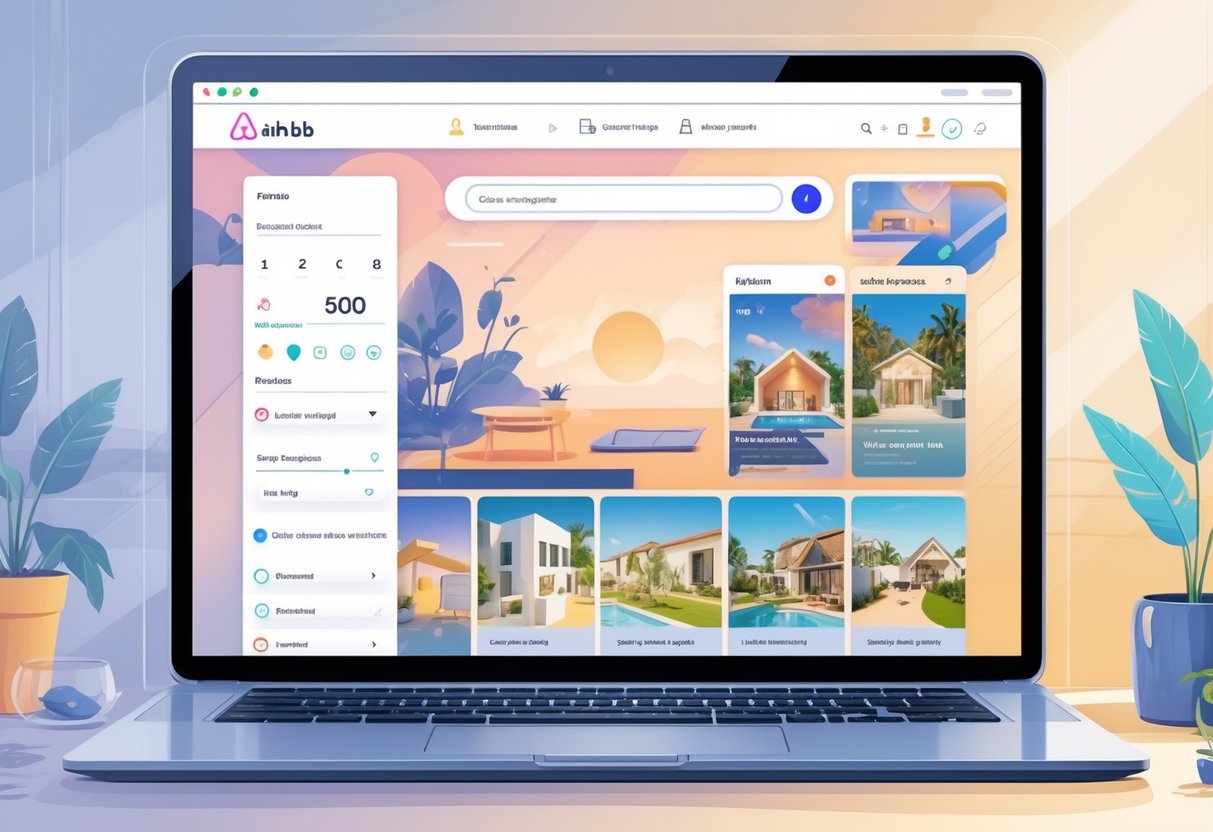

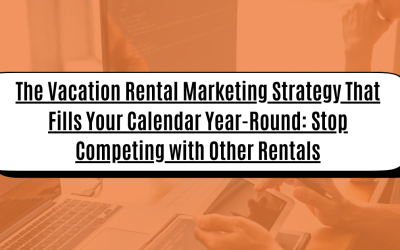

0 Comments